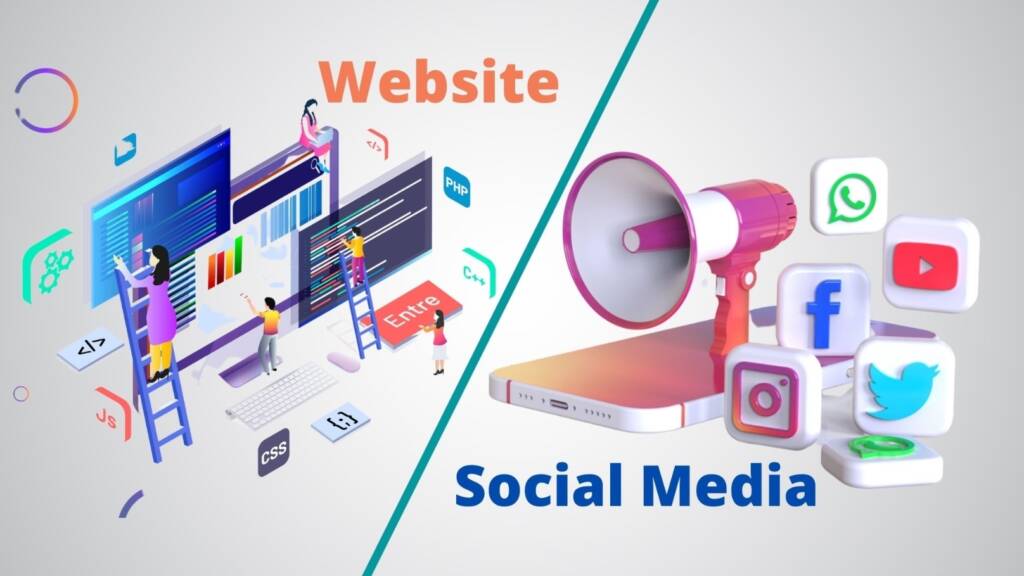
In today’s digital world, many businesses start by building a presence on social media platforms like Instagram, TikTok, and Facebook. These platforms are fantastic for creating awareness, engaging with customers, and driving initial sales. However, relying solely on social media to run your business can limit your long-term growth and stability.
As we enter 2024, having a dedicated website for your business isn’t just a nice-to-have—it’s essential for scalability, credibility, and growth. In this blog, we’ll explore why a website is a must and how it can elevate your business beyond the limits of social media.
1. Control Over Your Online Presence
While social media platforms offer tremendous reach, you don’t have full control over how your brand is presented. Changes to algorithms or platform policies can significantly reduce your visibility or access to your audience. For instance, recent changes to Instagram’s algorithm have resulted in a 30% decrease in organic reach for business pages.
Why a Website Matters:
With a website, you control everything—from how your content is displayed to how users navigate your business. No algorithms or third-party restrictions can affect how your audience interacts with your brand. It’s your space on the internet, built to reflect your unique vision and cater directly to your customers.
2. Credibility and Professionalism
In 2024, customers are more discerning than ever. While social media can help build trust, not having a professional website can raise doubts about the legitimacy of your business. According to a survey by Sweor, 75% of consumers admit to making judgments about a company’s credibility based solely on its website design. Without a website, potential customers may question whether your business is trustworthy.
Why a Website Matters:
A well-designed website gives your business instant credibility. It shows that you’re serious, professional, and established. Customers expect to find you on Google, and having a site where they can read reviews, explore services, and contact you directly helps build that essential trust.
3. Higher Visibility with SEO
Social media platforms do not rank on Google. This means that potential customers searching for your products or services might not find you if you’re only on Instagram or Facebook. With 93% of all online experiences starting with a search engine, not having a website means you’re missing out on a massive source of traffic.
Why a Website Matters:
A website optimized for search engines (SEO) can rank for key terms that people are searching for, giving you organic visibility that social media platforms can’t provide. This long-term traffic is crucial, as 53% of all website traffic comes from organic search. With a website, you’re more likely to be found by people who are ready to buy.
4. Increased Sales Opportunities
Social media platforms are great for product discovery, but they have limitations when it comes to closing sales. Shopping on platforms like Instagram or TikTok can feel disjointed, with users having to click away to external links or use less intuitive purchase processes. Additionally, social media relies heavily on impulse purchases and may not encourage repeat business.
Why a Website Matters:
An eCommerce-enabled website offers a seamless, branded shopping experience from start to finish. You can create upselling opportunities, showcase detailed product pages, and manage repeat customers through customer accounts and loyalty programs. Research shows that businesses with websites tend to see a 27.5% increase in revenue, thanks to smoother user journeys and better conversion rates.
5. Data Ownership and Analytics
One of the biggest drawbacks of relying solely on social media is that you don’t own your customer data. Platforms like Instagram and Facebook limit the data you can collect, which restricts your ability to truly understand your audience and their behaviors. In contrast, a website offers complete control over your data.
Why a Website Matters:
With a website, you can use tools like Google Analytics to track visitor behavior, analyze how users interact with your content, and collect emails for future marketing campaigns. This data is invaluable for making informed decisions and optimizing your marketing strategies. Additionally, having access to your own customer data allows you to create more personalized marketing experiences.
6. Stability and Longevity
Social media platforms are constantly evolving, and their features or even entire platforms could disappear overnight. Businesses that rely only on social media are vulnerable to these shifts, which can drastically affect their operations. Think of Vine, which had over 200 million users before shutting down, or MySpace, which faded from relevance.
Why a Website Matters:
A website gives your business stability. It’s a long-term investment that grows with your brand. No matter what happens to social media trends or platform algorithms, your website remains a consistent hub for your customers, ensuring they can always find and interact with your business.
7. Advanced Customization and Features
Social media platforms offer limited customization options. You’re bound by the platform’s format and rules. This restricts your ability to showcase your products, tell your brand story, or offer unique features that could improve customer engagement.
Why a Website Matters:
A website allows for endless customization. From personalized landing pages to fully integrated eCommerce systems, you can create unique user experiences that cater to your specific audience. You can also implement advanced features like chatbots, appointment scheduling, or even interactive tools that improve customer interaction.
Conclusion: The Perfect Balance—Social Media + Website
While social media is an essential part of your marketing strategy, relying only on social media is risky for long-term growth. In 2024, a website is not just an option—it’s a necessity. It provides stability, control, and credibility that social media platforms can’t offer.
Combining the engagement power of social media with the professionalism, visibility, and control of a website is the perfect strategy for success. This hybrid approach ensures your business can scale, adapt, and thrive in an ever-changing digital landscape.

